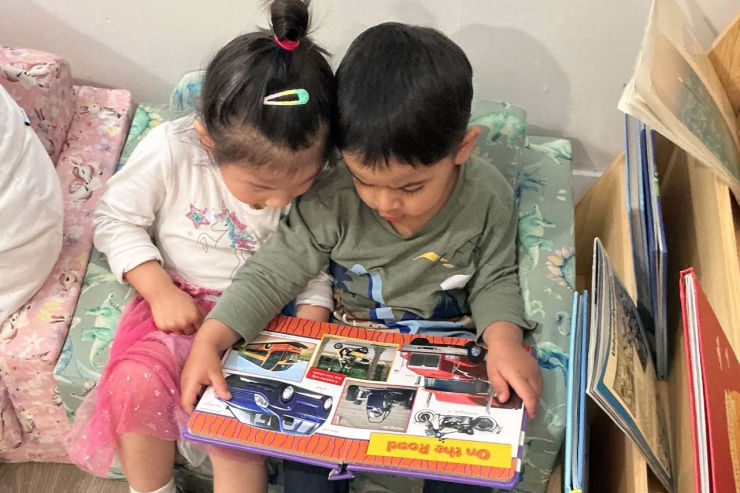How Small Group Learning Enhances Social Skills in Early Childhood
- info389619
- Oct 3, 2025
- 4 min read
Updated: Oct 4, 2025

You must have noticed how kids enjoy learning in small groups. They enjoy asking questions, laughing and sharing. Small Group Learning NSW not only helps improve the child’s reading and numeracy skills, but it also helps children develop social skills, which are important for survival in the real world.
At Kinderhaus Montessori Preschool, we believe laying a strong social foundation for kids at a young age is like giving them wings to fly and reach new heights. Small Group Learning NSW ensures that children receive proper instructions, helping them to develop their ability to interact, collaborate, and grow as members of the community.
Why Social Skills Matter in Early Childhood
Social skills help build strong relationships. By learning social skills, kids learn how to take turns while playing, share toys, express their emotions, and settle disputes. Without social skills, academic learning is incomplete.
Social skills are like a tree's roots. Just like a tree cannot grow strong without deep roots, children, too, cannot flourish without learning how to interact with others. Small group learning plays an important role in such situations.
More Opportunities to Talk and Listen
Quiet and shy kids can get lost in a big group. However, every child gets an opportunity to speak up and be heard in smaller groups. In small groups, children learn to wait for their turn to speak, listen to others, and express their own opinions.
Daily conversations help children learn the give-and-take of communication and gain confidence. Even shy kids eventually discover their voice and start speaking openly with ease.
Collaboration and Teamwork in Action
Small Group Learning NSW encourages teamwork. Children learn to work together, play group games, solve puzzles, and do storytelling exercises. They understand that each person is unique and can offer something valuable.
For example, one child has an idea, and another child helps put the idea into action. These experiences teach children that teamwork can lead to better outcomes and is more enjoyable than working alone.
Learning How to Resolve Conflicts
It is human to have disagreements, so whether it is adults or preschoolers, conflicts are inevitable. Children have disagreements about toys, space, or concepts. However, when managing a small group, teachers are able to focus on each child and teach them constructive ways to deal with these conflicts.
Teachers encourage children to find solutions and come to a conclusion, rather than intervening in between. They encourage them to talk, listen, and work together. This is really beneficial to the children, as they learn to develop problem-solving skills and about empathy and fairness.
Developing Respect and Empathy
Empathy develops with experience; it does not come naturally. In small groups, children get an opportunity to hear diverse perspectives and emotions from their peers. Over time, they learn to appreciate and understand others’ opinions and their feelings.
For example, if a child is sad, another child shares a toy or offers consolation. These small gestures help develop empathy and teach kids that respect and kindness are effective means of fostering connections.
Boosting Confidence Through Involvement
When kids feel included, they become more confident. Small group learning in NSW ensures no child is left out. Every child is allowed to lead a small activity, reply to questions, or share ideas.
Personalized attention assures the children that their contributions are valued and appreciated. This helps boost their confidence, and they start believing in themselves, experiment with new things, and take calculated risks.
Preparing Children for School and Beyond
Studies have shown that children who are part of the small group learning programmes not only do better academically but also develop stronger social skills when they start primary school. Learning in small groups reflects real-world circumstances.
Just like adults in workplaces or communities, children learn to communicate, collaborate, and compromise. These abilities help them establish lasting relationships and academic success.
Conclusion
Small group learning NSW is not a regular teaching approach; it helps develop both the minds and hearts of the children. It encourages communication, teamwork, empathy, and confidence, helping children learn social skills that will be useful to them in their lives.
At Kinderhaus Montessori Preschool, our small group learning programme helps children develop socially and academically. Our team of knowledgeable teachers and a nurturing atmosphere helps prepare them to reach new heights.
FAQs
1. How does small group learning help shy children develop social skills?
In small groups, shy children get more opportunities to talk and engage. This helps boost their confidence and develop social skills.
2. Can small group learning reduce conflicts among children?
Yes. Teachers guide children to resolve disagreements by talking, listening, and finding solutions together, which reduces conflicts over time.
Yes. In small groups, teachers help settle disputes by making the children talk to each other and work together to find solutions. This eventually helps reduce conflict.
3. Why is small group learning better for social skills than large classes?
Children may be overlooked in large groups or classes. When studying in small groups, each child gets an opportunity to participate, receive attention, and gain social confidence.
4. Does small group learning also improve academic skills?
Small groups improve literacy, numeracy, and critical thinking, along with social skills. This helps create a well-rounded educational experience.





Comments